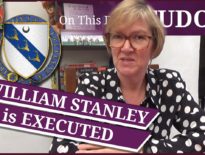On this day in Tudor history, 15th February 1564, the Italian physicist, mathematician, astronomer, and philosopher, Galileo Galilei, was born in Pisa, Italy.
Galileo was one of the central figures of the Scientific Revolution and has been referred to as "the Father of Modern Science", "the Father of Modern Physics" and "the father of modern observational astronomy", but what exactly did he do and how did he end up getting into trouble with the Inquisition?
Find out in today's talk.
Also on this day in Tudor history, 15th February 1551, businessman Thomas Arden was finally successfully murdered after a few botched attempts on his life. Find out more about his murder, and the previous attempts, in last year’s video:
Also on this day in history:
- 1499 – Death of James Goldwell, Bishop of Norwich, at the bishop's palace in Hoxne, Suffolk. He was buried in Norwich Cathedral, in the chantry chapel.
- 1503 – Death of Henry Deane, administrator and Archbishop of Canterbury. As well as serving Henry VII as Archbishop, Deane also served as Chancellor of Ireland, Deputy Governor for Prince Henry and Keeper of the Great Seal. He died at Lambeth Palace and was buried at Canterbury Cathedral at a lavish funeral.
- 1536 – Death of Richard Rawlins, Bishop of St David's and former warden of Merton College.
- 1571 – Death of Sir Adrian Poynings, soldier. He served as a soldier in Boulogne from 1546 to 1550, when he was made Lieutenant of Calais Castle, then in the St Quentin campaign of 1557 and in Le Havre in 1562.
- 1598 – Death of John May, Bishop of Carlisle, at Rose Castle, his episcopal residence. He was buried in Carlisle Cathedral.
- 1616 – Death of Sir George Carey, Lord Deputy of Ireland. He was buried at c*ckington, Devon.
Transcript
On this day in Tudor history, 15th February 1564, the Italian physicist, mathematician, astronomer, and philosopher, Galileo Galilei, was born in Pisa, Italy. He was the eldest child of musician, composer and music theorist Vincenzo Galilei and his wife Giulia.
Galileo considered becoming a priest, but instead studied at the University of Pisa, choosing medicine to start with, and then changing to mathematics and natural philosophy.
Galileo was one of the central figures of the Scientific Revolution and supported Copernicanism (the heliocentric model). He has been referred to as “the Father of Modern Science”, “the Father of Modern Physics” and “the father of modern observational astronomy”. He is also known for his discovery of the Galilean Moons (Jupiter's satellites Io, Europa, Ganymede and Callisto), his improved military compass and his work on the telescope, which allowed Jupiter’s satellites to be seen, as well as the moon’s mountains.
But what else did Galileo do?
• He created a hydrostatic balance to measure the density of objects.
• He invented the thermoscope, a forerunner of the thermometer.
• He invented Galileo’s pump, a device for raising water using only a single horse.
• He began work on a pendulum clock but died before his design was finished.
• He saw that the Milky Way was not just a band of light, but was made up of stars.
Trivia: Galileo had three illegitimate children, two daughters and a son, by Marina Gamba.
In 1633, he was tried for heresy by the Inquisition for his view that he earth revolved around the sun, which he’d made public in his 1632 work “Dialogue Concerning the Two Chief World Systems - Ptolemaic and Copernican”. The Catholic Church promoted the belief that the Earth was at the centre of the universe and that all the heavenly bodies revolved around the earth. He was found guilty, forced to publicly recant and spent the rest of his life under house arrest.
Galileo died in Arcetri, near Florence, on 8th January 1642, aged 77.
I’ll leave you with a Galileo quote. It’s taken from his 1615 letter to the Grand Duchess Christina, in which he was defending science against those who attacked it on the grounds of religion:
“But I do not feel obliged to believe that that same God who has endowed us with senses, reason, and intellect has intended to forgo their use and by some other means to give us knowledge which we can attain by them. He would not require us to deny sense and reason in physical matters which are set before our eyes and minds by direct experience or necessary demonstrations.”



His relationship with his daughter was his most important relationship he had. She became a nun and his letters to her are warm and affectionate. He visited her regularly while under house arrest. Oh, yes, he was allowed visitors and lived in luxury under house arrest. People thinking house arrest often think of someone being totally confined, little contact, no visits out, but it wasn’t like that for important prisoners and Galileo is known to have had one of the most flexible on record. He of course wasn’t free, opinions were not free at that time and his quarrel was made more difficult because it became personal. Although he was ultimately right, he couldn’t and didn’t prove his theory at the time. It wasn’t possible to do so and in fact he was told so. The Vatican had one of the most advanced observatory in the world, one of the best equipped, it still is, so these people he argued with were not against scientists as is often taught, they said he should say it was a theory, not that he was correct. He was one arrogant son of a do da and had a personal quarrel with the Pope, an old friend and acquaintance and several members of the Inquisition whom he actually knew well. He insulted one with a crest on the publication for one thing. It actually all got very ugly. Ultimately of course he was found guilty and his views condemned but he was actually allowed to still write and other papers published. His theories were not scientifically confirmed until the nineteenth century. He wasn’t pardoned until the 1980s although the Church accepted his views long ago, when their own astronomers confirmed it. Galileo remains one of three or four important astronomers of history, with Thycho, Copernicus and Newton. He was a fascinating character and unfortunately a lot of nonsense is taught about his quarrel with the Church, so thanks for reporting it accurately.
Virginia or Maria Celeste remained his most constant companion through her letters, 120 of which are preserved.
Very interesting, Claire, thanks! Michelle t